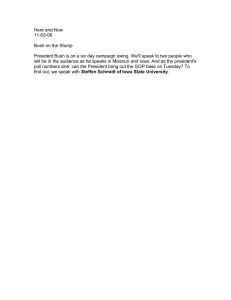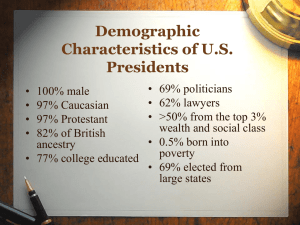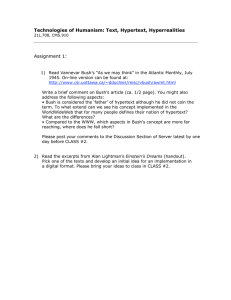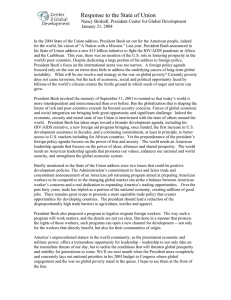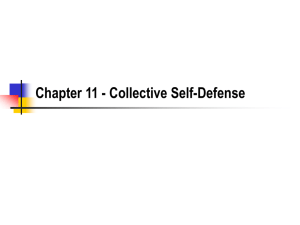Steps Toward a Successful Presidency C. Eugene Steuerle
advertisement
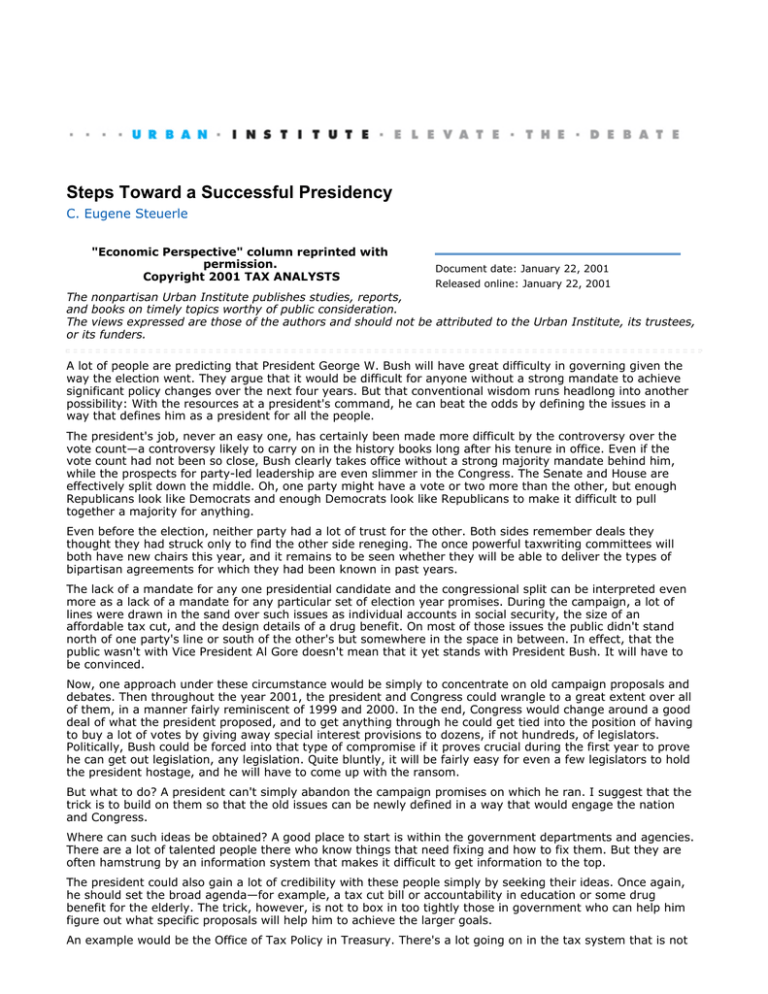
Steps Toward a Successful Presidency C. Eugene Steuerle "Economic Perspective" column reprinted with permission. Copyright 2001 TAX ANALYSTS Document date: January 22, 2001 Released online: January 22, 2001 The nonpartisan Urban Institute publishes studies, reports, and books on timely topics worthy of public consideration. The views expressed are those of the authors and should not be attributed to the Urban Institute, its trustees, or its funders. A lot of people are predicting that President George W. Bush will have great difficulty in governing given the way the election went. They argue that it would be difficult for anyone without a strong mandate to achieve significant policy changes over the next four years. But that conventional wisdom runs headlong into another possibility: With the resources at a president's command, he can beat the odds by defining the issues in a way that defines him as a president for all the people. The president's job, never an easy one, has certainly been made more difficult by the controversy over the vote count—a controversy likely to carry on in the history books long after his tenure in office. Even if the vote count had not been so close, Bush clearly takes office without a strong majority mandate behind him, while the prospects for party-led leadership are even slimmer in the Congress. The Senate and House are effectively split down the middle. Oh, one party might have a vote or two more than the other, but enough Republicans look like Democrats and enough Democrats look like Republicans to make it difficult to pull together a majority for anything. Even before the election, neither party had a lot of trust for the other. Both sides remember deals they thought they had struck only to find the other side reneging. The once powerful taxwriting committees will both have new chairs this year, and it remains to be seen whether they will be able to deliver the types of bipartisan agreements for which they had been known in past years. The lack of a mandate for any one presidential candidate and the congressional split can be interpreted even more as a lack of a mandate for any particular set of election year promises. During the campaign, a lot of lines were drawn in the sand over such issues as individual accounts in social security, the size of an affordable tax cut, and the design details of a drug benefit. On most of those issues the public didn't stand north of one party's line or south of the other's but somewhere in the space in between. In effect, that the public wasn't with Vice President Al Gore doesn't mean that it yet stands with President Bush. It will have to be convinced. Now, one approach under these circumstance would be simply to concentrate on old campaign proposals and debates. Then throughout the year 2001, the president and Congress could wrangle to a great extent over all of them, in a manner fairly reminiscent of 1999 and 2000. In the end, Congress would change around a good deal of what the president proposed, and to get anything through he could get tied into the position of having to buy a lot of votes by giving away special interest provisions to dozens, if not hundreds, of legislators. Politically, Bush could be forced into that type of compromise if it proves crucial during the first year to prove he can get out legislation, any legislation. Quite bluntly, it will be fairly easy for even a few legislators to hold the president hostage, and he will have to come up with the ransom. But what to do? A president can't simply abandon the campaign promises on which he ran. I suggest that the trick is to build on them so that the old issues can be newly defined in a way that would engage the nation and Congress. Where can such ideas be obtained? A good place to start is within the government departments and agencies. There are a lot of talented people there who know things that need fixing and how to fix them. But they are often hamstrung by an information system that makes it difficult to get information to the top. The president could also gain a lot of credibility with these people simply by seeking their ideas. Once again, he should set the broad agenda—for example, a tax cut bill or accountability in education or some drug benefit for the elderly. The trick, however, is not to box in too tightly those in government who can help him figure out what specific proposals will help him to achieve the larger goals. An example would be the Office of Tax Policy in Treasury. There's a lot going on in the tax system that is not working well; that creates needless complexity for too many taxpayers. And the tax policy office is clearly one of the finest and most talented offices in government. The new president can use this office to help define a tax agenda that extends beyond the campaign. Bush should also look ahead four or eight years. How does he want to be remembered when it's all over? Let's face it, to go down well in the history books requires more than getting some legislation passed. The president or the people on whom he relies must have some vision of significant reform in some areas—education, taxation, social security, or health care being among the most likely candidates in the domestic arena. Fortunately, those are areas Bush has already listed as priorities. So over the next few years he might as well go for something grand in one or more of these areas. Becoming a successful president is not as hard as it might appear under the circumstances. It requires playing the hand that one is dealt. There are extraordinary powers inherent in the Office of the President, not the least of which is command of an extraordinary amount of resources within the Executive Branch itself. If employed wisely, Bush can use those resources and set agendas to step over and around the partisan bickering being predicted by many for the next four years. Other Publications by the Authors C. Eugene Steuerle Usage and reprints: Most publications may be downloaded free of charge from the web site and may be used and copies made for research, academic, policy or other non-commercial purposes. Proper attribution is required. Posting UI research papers on other websites is permitted subject to prior approval from the Urban Institute—contact publicaffairs@urban.org. If you are unable to access or print the PDF document please contact us or call the Publications Office at (202) 261-5687. Disclaimer: The nonpartisan Urban Institute publishes studies, reports, and books on timely topics worthy of public consideration. The views expressed are those of the authors and should not be attributed to the Urban Institute, its trustees, or its funders. Copyright of the written materials contained within the Urban Institute website is owned or controlled by the Urban Institute. Source: The Urban Institute, © 2012 | http://www.urban.org
